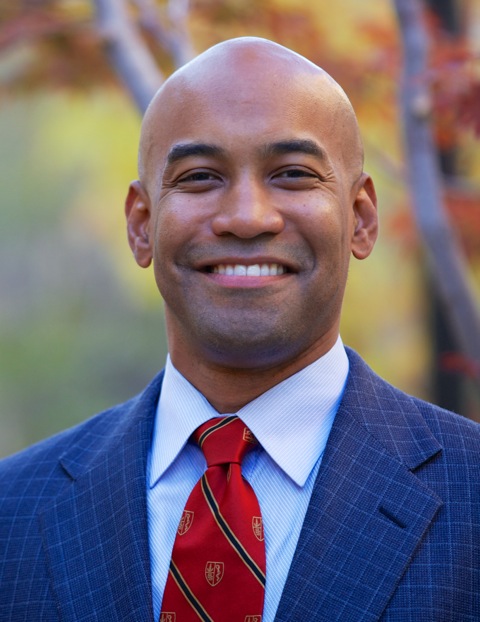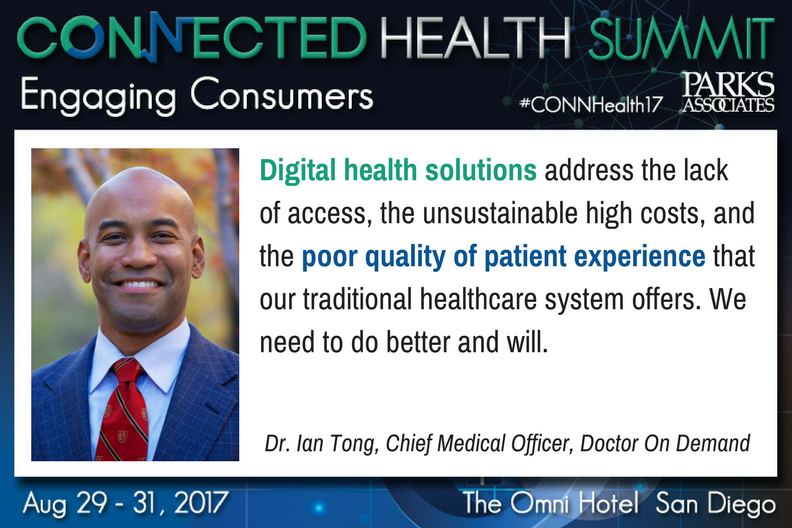 Dr. Ian Tong, Chief Medical Officer at Doctor On Demand, provided his insights to Parks Associates analyst team regarding growth in the connected health markets. Doctor On Demand’s mission is to improve the world’s health through compassionate care and innovation. Through live video visits, our US-trained doctors take patient history, perform an exam, and recommend a treatment plan. Prescriptions, if needed, go directly to the pharmacy of choice. While insurance isn’t required, tens of millions of Americans enjoy covered medical and mental health visits through employer and health plan partnerships.
Dr. Ian Tong, Chief Medical Officer at Doctor On Demand, provided his insights to Parks Associates analyst team regarding growth in the connected health markets. Doctor On Demand’s mission is to improve the world’s health through compassionate care and innovation. Through live video visits, our US-trained doctors take patient history, perform an exam, and recommend a treatment plan. Prescriptions, if needed, go directly to the pharmacy of choice. While insurance isn’t required, tens of millions of Americans enjoy covered medical and mental health visits through employer and health plan partnerships.
Dr. Tong will participate on the session, Virtual Care: Innovations Driving Patient Usage, at Parks Associates' fourth-annual Connected Health Summit: Engaging Consumers, Aug 29-31 in San Diego. The session will be held Wednesday, August 30 and will also feature the following participants:
- Andrew Altorfer, CEO, CirrusMD
- Autumn Braswell, COO, Global Solutions, Marketing, LinQ, iQor
- Chuck Hector, Chief Sales Officer, MDLIVE, Inc.
- Kevin L. Smith, DNP, FNP, FAANP, Chief Clinical Officer, Zipnosis, Inc
Q. What's new in 2017 that keeps you upbeat/optimistic about the digital health products and services?
A. We’re at an exciting inflection point in the industry. Amid proposed changes to the Affordable Care Act, there are an increasing number of states that recognize the opportunity for digital health solutions like telemedicine, which alleviates some of the financial, economic, and geographical pressures local healthcare markets are experiencing. People would have to take time off to see a doctor, travel hours to the doctor’s office, let alone wait in the waiting room. However, just in the last six months, Texas and Arkansas implemented new legislation that enable their residents to access a doctor through video visits—and it’s only going to continue growing.
Video medicine providers like Doctor On Demand connect patients with a board-certified physician within minutes, no matter where they are. Now with Texas and Arkansas, Doctor On Demand is available in all 50 states in the U.S., supporting some of the country’s largest employers and health insurance providers. Earlier this year, we announced the launch of lab testing services to provide patients better everyday care by fully integrating the patient experience. It is humbling and gratifying to have served over one million patients and helped them save countless hours spent driving to the doctor or sitting in the waiting room. If this is just what we can do as one company, we’re optimistic about what the industry will look like in the coming years.
Q. What's the most effective strategy/approach you have seen that engages consumers for health & wellness behavioral changes?
A. We’ve found that video medicine is an effective strategy to engage patients, especially when they can schedule follow-up appointments with the same doctor. Video medicine not only enables patients to build as meaningful doctor-patient relationships as they would with an in-person experience, but also allows the doctor to track the patient’s progress. Because Doctor On Demand connects patients through video, doctors are able to visually detect critical non-verbal cues as they guide patients through a physical exam. As a result, doctors are better able to accurately diagnose and treat their patients.
Q. What do you anticipate to happen in 2018 that would have the biggest impact on the digital health market?
A. With healthcare costs continuing to rise, the healthcare system has no choice but to become more efficient in order to provide care for the same number of people. Telemedicine, which expands access to care and reduces costs, becomes a must-have solution.
Worldwide revenue for telehealth services is expected to hit $4.5 billion next year, and the number of patients using telehealth platforms is projected to grow to 7 million. What’s more, 61% of consumers say they are open to using virtual healthcare services. As a result, I expect to see more telemedicine providers and digital health companies join the market to provide affordable, accessible care.

Q. What are the biggest barriers to adoption of digital health solutions for consumers?
A. Adopting new technology makes many people wary, especially when it comes to trusting someone with your health and personal information. Many patients can be hesitant to switch from the traditional in-office doctor visit to one where the face-to-face doctor-relationship exists on screen . According to a recent study, more than half of consumers are willing to use a virtual healthcare service, but only 16 percent have done so in part is due to the concern of losing the doctor-patient relationship. However, digital solutions like video medicine allow patients to still see and build a relationship with a doctor as they would have otherwise -- all in the the comfort of their own home (or wherever they may be).
Q. How do you feel the digital health market will impact the smart home?
A. Smart home technology is still somewhat in its early stages, but there is an opportunity to have all of these different ‘smart’ technologies interact and ‘talk’ with each other. The healthcare and technology industry consumers know today operate independently of each other and have their own regulations to abide by. However, emerging digital health solutions are starting to blur the lines between the two industries. As the smart home and digital health markets continue to evolve, these industries will function as an ecosystem rather than in silos.
Video medicine providers like Doctor On Demand already enable doctors to better identify how a patient’s surroundings could attribute to their symptoms. But when connected with other smart devices in the home, these other devices can improve the wellbeing of the patient such as reminding them when to take their medication, stocking the refrigerator with healthy foods or removing materials that can cause allergic reactions. Because these devices, apps and software are interconnected, doctors can better understand the patient’s environment and help remove barriers to treatment.
Q. Who do you feel will be the most effective at delivering digital health solutions to consumers?
A.The most effective digital health solutions are those that put both the doctor and the patient at the center of their solution. The relationship between doctor and patient is based on trust and digital health solutions that build focus on quality will enhance that feeling of trust. Those companies who can help patient consumers overcome the barriers of adopting new technology, while providing more cost-effective and accessible services without compromising trust, quality or relationships, will be the most successful long term.
Q. What do you feel are the biggest pain points for consumers when it comes to healthcare and wellness?
A. Cost and accessibility. The U.S. healthcare industry is at a crossroads when it comes to providing affordable care to those who need it. It consistently ranks as one of the least-effective healthcare systems in the world, yet it requires heavy financial support from the government. As a result, it is even more imperative that we find ways to bring health care costs down, and telemedicine will be a key part of that equation.
Secondly, there is a growing trend among payers that are shifting more health care costs to consumers (e.g. through high-deductible plans), which is increasing the financial burden of many consumers. McKinsey reported that roughly three-quarters of senior corporate managers have already increased, or are planning to increase, the share of healthcare costs borne by employees. About one-third reported that their companies currently offer high-deductible healthcare plans, and two-thirds of the others said their companies are in the process of introducing those accounts or plan to do so.
Q. What is the biggest catalyst to growth for the digital health market?
A. Necessity. Whether you consider healthcare a right, a nuisance, or a broken mess, the universal truth is that we all need and deserve access to outstanding healthcare. Digital health solutions address the lack of access, the unsustainable high costs, and the poor quality of patient experience that our traditional healthcare system offers. We need to do better and will.
For more information on the speakers, sponsors, or agenda for Connected Health Summit, visit www.connectedhealthsummit.com.
Further Reading:


